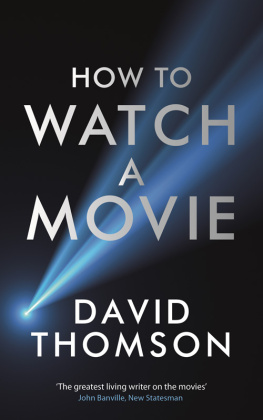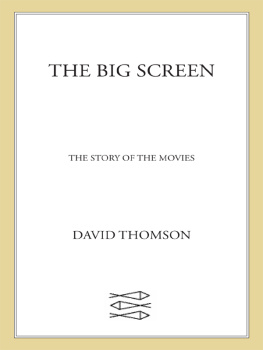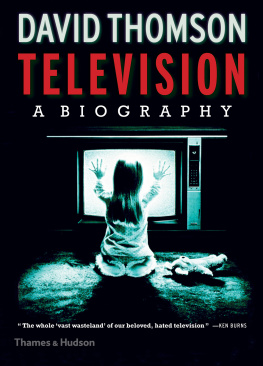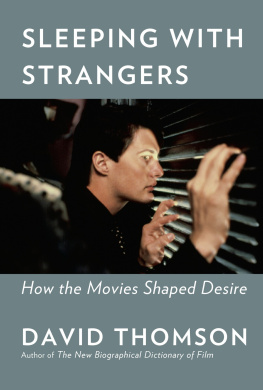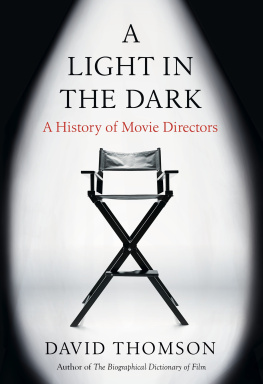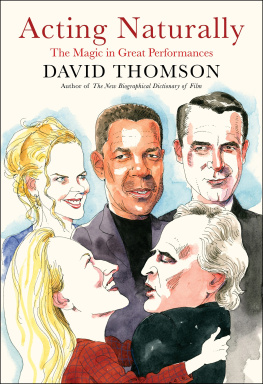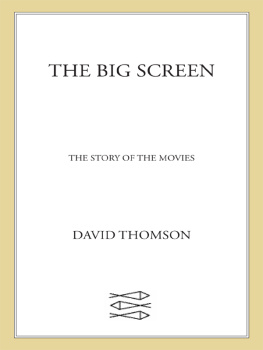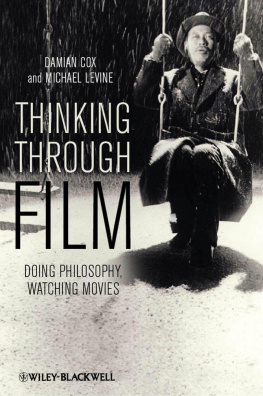HOW TO
WATCH
A
MOVIE
DAVID THOMSON, without doubt, the greatest living film historian (LA Times), is the author of the seminal New Biographical Dictionary of Film, now in its sixth edition, Have You Seen ?, Nicole Kidman and The Big Screen. Born in London, Thomson now lives in San Francisco.
ALSO BY DAVID THOMSON
Why Acting Matters
Moments That Made the Movies
The Big Screen: The Story of the Movies
Try to Tell the Story
Have You Seen ?
Nicole Kidman
The Whole Equation
The New Biographical Dictionary of Film
In Nevada: The Land, the People, God, and Chance
The Alien Quartet
Beneath Mulholland: Thoughts on Hollywood and Its Ghosts
Rosebud: The Story of Orson Welles
42
Showman: The Life of David O. Selznick
Silver Light
Warren Beatty and Desert Eyes
Suspects
Overexposures
Scotts Men
America in the Dark
A Biographical Dictionary of Film
Wild Excursions: The Life and Fiction of Laurence Sterne
Hungry as Hunters
A Bowl of Eggs
Movie Man
HOW TO
WATCH
A
MOVIE
DAVID
THOMSON

First published in Great Britain in 2015 by
PROFILE BOOKS LTD
3 Holford Yard
Bevin Way
London
WC1X 9HD
www.profilebooks.com
First published in the United States of America in 2015 by
Alfred A. Knopf, a division of Penguin Random House
Copyright David Thomson, 2015
The moral right of the author has been asserted.
All rights reserved. Without limiting the rights under copyright reserved above, no part of this publication may be reproduced, stored or introduced into a retrieval system, or transmitted, in any form or by any means (electronic, mechanical, photocopying, recording or otherwise), without the prior written permission of both the copyright owner and the publisher of this book.
A CIP catalogue record for this book is available from the British Library.
eISBN 978 1 84765 883 8
For Kate, Mathew, Rachel, Nicholas, and Zachary
Ill try not to raise the subject again
It was fairly obvious that the cinema should be my chosen means of expression. I made myself understood in a language that bypassed words, which I lacked; music, which I have never mastered; and painting, which left me unmoved. Suddenly, I had the possibility of corresponding with the world around me in a language that is literally spoken from soul to soul, in terms that avoid control by the intellect in a manner almost voluptuous.
INGMAR BERGMAN,
on receiving the Erasmus Prize, 1965
ARE WE HAVING FUN?
S ome people believe film critics are cold-blooded. Whereas many audiences hope to come away from a movie shaking with fear, helpless in mirth, or simply bursting with happiness, a critic sneaks away from the show, a little hunched, with a secretive smile on his face. Its almost as if the film were a bomb, or a bombe, an artful explosion, and the critic was a secret agent who had planted it and now takes a silent pride in the way it worked. And how it worked. Audiences believe they deserve a good time, and some feel that dismantling the machine can get in the way of the fun.
Thats some peoplethank God its not you. If it were you, you wouldnt be holding me in your hand or your lap, ready to read a book about how to watch a movie. Your being here suggests you feel the process is tricky enough to bear examining. In the first sixty years or so of this medium, the cinema behaved as if pleasure was its thing, and its only thing; but in the sixty years since, new possibilities have emerged. One is that pictures are not just mysteries like The Maltese Falcon or The Third Man, but mysteries like Blow-Up and Persona, or Magnolia or Amour, which ask, well, what really is happening, what do these cryptic titles mean, and what are those frogs in Magnolia meant to be? There is something else: a wave of generations now think some movies might be as fine as anything we do, as good as ice cream or Sondheim, things you cant get out of your head, where watching (or engagement) becomes so complex and lasting that you may welcome guidance.
In the 1960s, when film study first took hold in academia, there were well-meaning books that tried to explain what long shots and close-ups were, with illustrations, and what these shots were for. Such rules were at best unreliable. They felt as if assembled by thought police, and they depressed anyone aroused by the loose Bonnie and Clydelike impulsiveness on screen. I pick that film because its symptomatic of a sixties energy in movies, a feel for danger and adventure: hang on, this is a bumpy ride, and should we be having such fun killing people? Is it a genre film about 1932 or some cunning way of talking to 1967?
Im more interested in discussing that experience: the way film is real and unreal, at the same time; what a shot is, or can be, and a cut; how we work up story from cinematic information and the helpless condition of voyeurism; what sound does (its apparent completion of realism, as well as its demented introduction of music in the air); the look of money in movies (no art has ever been as naked about this, or such a prisoner to it); the everlasting controversy over who did what; and the myth known as documentary (is it salvation or just another story-telling trick?).
More than that, the ultimate subject of this book is watching or paying attention (that encompasses listening, fantasizing, and longing for next week) and so it extends to watching as a total enterprise or commitment. Driving can be fun, too, and its passionate progress resembles moviesits motion is emotional. But a driver has to watch not just driving, but the road, the light, the weather, and the unexpected action of strangers. So as well as discussing movies, I will speculate on reading, looking at paintings, watching wildlife at the beach, or the wilder life in people close to you, and the total matter of how we see ourselves in life. It comes to this: a hundred and fifty years ago, people lived a life and referred it to books, games, and works of moral instruction. But in the time since then we have acquired this mechanism that mimics the way we attend to the world as a whole. Often enough, it supplants living, to say nothing of moral instruction. So we watch, but we watch ourselves watching.
Think of these models: there is watching as surveillance, or bearing dispassionate witness: you see waves breaking on the shore; you see flowers bloom and wither; you see your own infants become adults. This watching takes years; it lasts out your life. And it dismisses most schemes of judgment, even if that lesson takes time. But then something happens in the spectacle: one wave coming in bears a bodyis it a corpse or a mermaid? That flower youre seeing is picked by a good-looking person. Your child is doing something dangerous. The melodrama of story begins, and movies cling to melodrama.
Once upon a time, movies had elementary and appealing mysteries or quests in their shape. Like the lost girl. So many movies had that mythic pursuit: in Way Down East, Lillian Gish plays a fallen womancan she be rescued? In Sunrise, Janet Gaynor is a wife on the edge of being murderedwill she be saved? In City Lights, the tramp loses the blind girl once she can see. In Casablanca, Ingrid Bergman was lost to Humphrey Bogart, but here she comes againcan she save him? In
Next page
